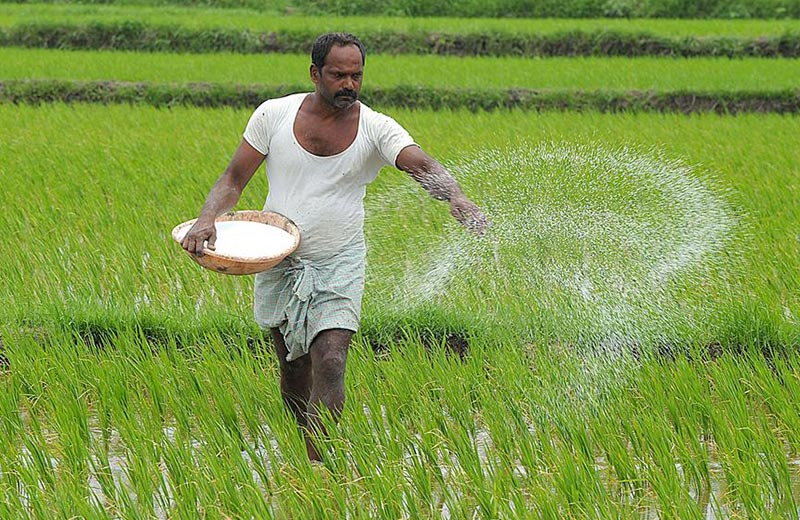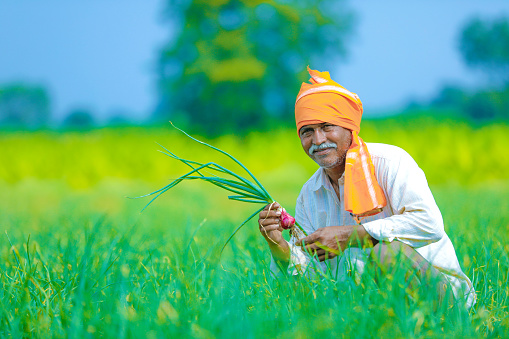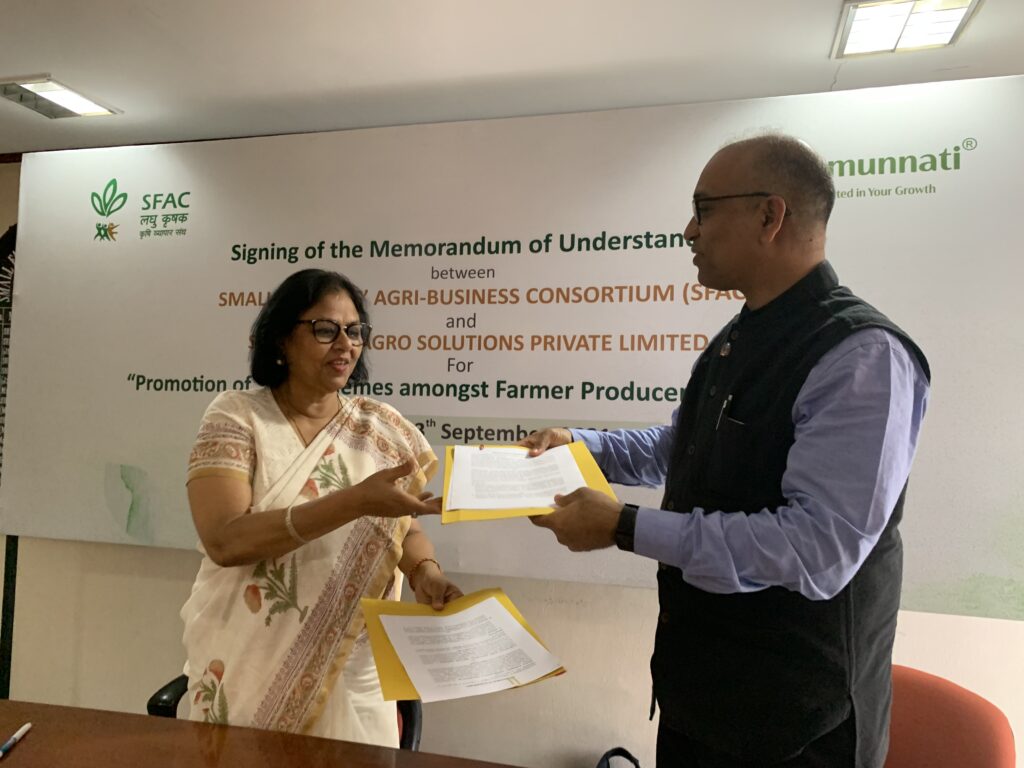Climate change presents an increasingly urgent challenge to the agricultural communities of India.The impact of it on farmers, in relation to both productivity and livelihoods, cannot be emphasized enough. The shifting weather patterns, unpredictable rainfall, and the increasing frequency of extreme events are posing severe threats to India’s agrarian landscape. In the face of these challenges, we at Samunnati, have taken proactive measures to address the pressing issues faced by Indian farmers and support them in adapting to this changing climate.
First and foremost, it is crucial to acknowledge that climate change is not a distant threat; it is a current reality with far-reaching consequences for Indian agriculture. Our nation is already witnessing the manifestations of climate change in the form of untimely floods, erratic monsoons, and the emergence of new pests and diseases. It is imperative that we recognize the immediacy of this problem and engage in a meaningful dialogue on climate change.
One of the most evident impacts of climate change on Indian agriculture is the disruption of traditional farming practices. Sowing patterns, once synchronised with the arrival of monsoons and cultural festivals, are now in a state of flux. Monsoons have become increasingly erratic, making it challenging to predict when and how much rain will fall. Temperature fluctuations have also become a cause for concern, as exemplified by the threat to mustard crops during freezing conditions.
Additionally, farmers are grappling with the emergence of new, pesticide-resistant pests, such as the pink bollworm in cotton farming. The unpredictability of weather and the effects of climate change have left farmers ill-prepared to adapt to these challenges, and there is currently no comprehensive mitigation strategy at the farmer level.
When assessing the readiness of Indian farmers to confront climate change, we must consider two dimensions: the farmers themselves and the policy level. Farmers need to be made aware of the changes and challenges posed by climate change. Thanks to policy efforts and increasing exposure to the consequences of climate change, many farmers are now more aware of the need to adapt.
However, the transition to climate-smart agriculture practices requires accessible and affordable solutions. While technology interventions are emerging, they must reach the farmers effectively. For instance, drip irrigation has shown promise in conserving water resources and adapting to climate change. To facilitate this transition, policymakers can play a significant role by providing a safety net to farmers during the adoption phase.
Mitigating the impact of climate change at the farmer level requires a multi-pronged approach. Five critical dimensions need to be addressed:
Awareness: Farmers need to be aware of the changes in agriculture practices necessitated by climate change. There is a growing understanding of what actions to take in response to the challenges.
Mitigation: Solutions that mitigate the impact of climate change must be made available and accessible to farmers. We’re observing promising developments in technology adoption, with individuals exploring the use of technological solutions to address certain changes. However, it’s important to note that these technologies have not yet reached the farmers.
Adoption: Farmers must be incentivized to adopt climate-smart agricultural practices through a combination of insurance products, subsidies, and safety nets. Encouraging farmers that they will receive at least the same earnings as they would have with their previous farming practices.
Ease of Adoption: The transition to new practices should be as straightforward as possible, considering factors like manual labour, mechanisation, and ecosystem changes. The smoother the adoption process, the more favourable it is for farmers to transition to these practices.
Adaptation: Practices must provide immediate benefits to farmers and adapt to the evolving climate.
The adoption of climate-smart agricultural practices should be facilitated through a combination of income protection for farmers, the availability of innovative solutions, and the adaptability of practices to climate change.
Climate change affects more than just farming; it impacts the entire agricultural ecosystem. We can view climate change from a carbon perspective, where the carbon content in the soil and the atmosphere play crucial roles.
Enhancing carbon content in the soil is essential for mitigating atmospheric carbon. Initiatives like the “4P by 1000” aim to increase soil carbon content by 4 parts per 1000, effectively offsetting atmospheric carbon. This can be achieved through practices like biochar application to the soil, which enriches the carbon content.
Moreover, the vitality of the soil is vital for successful agriculture. Many land masses are losing their ability to support farming due to diminishing soil health. Soil health is to agriculture what net worth is to a business, emphasising the importance of maintaining soil vitality.
We at Samunnati Foundation have strategically positioned ourselves as a catalyst for CSR initiatives undertaken by diverse institutions and organisations, with a distinct focus on enhancing last-mile execution excellence. This approach encompasses several key elements:
Strategic Partnerships: Our foundation collaborates with various organisations, including corporations, non-governmental entities, and academic institutions, leveraging a wide network for CSR initiatives. Some of them are DCM Shriram Foundation, Corteva CSR, USDFC, BMGF, among others.
Tailored Project Design: Our Foundation customises projects according to the specific requirements and objectives of CSR partners, ensuring alignment with their corporate social responsibility goals.
Capacity Building & Training: We invest in robust capacity-building programs, such as the Leadership Excellence Academy for FPOs (LEAF) and the FPO Academy, to equip stakeholders with essential skills and knowledge. It also promotes women entrepreneurs through “Support for Women Entrepreneurs in Agriculture (SEWA).”
Community Engagement: Our foundation conducts meticulous community engagement efforts, with initiatives such as mobilisation meetings and sensitization sessions, fostering trust and active participation of local communities.
Knowledge Dissemination: Samunnati’s FPO Academy serves as a dynamic knowledge-sharing platform, facilitating the dissemination of best practices and knowledge to other organisations keen on engaging in CSR activities.
Technology Access: Our foundation facilitates access to cutting-edge agricultural technologies and solutions, including climate-smart agriculture (CSA) practices. This includes providing access to climate-resilient crop varieties, precision farming equipment, and digital tools that enhance productivity and sustainability in farming practices.
Monitoring and Evaluation: We maintain robust monitoring and evaluation mechanisms to track the impact of CSR initiatives at the last mile. This data-driven approach enables continuous improvement and ensures that outcomes align with CSR goals.
Scalability: Our model is designed for scalability, allowing successful CSR initiatives to be replicated in other last-mile communities, further extending the reach and impact.
Additionally, our foundation operates a separate vertical or portfolio known as Climate Smart Agriculture Finance, which is dedicated to guiding actions needed to transform and reorient agricultural systems to effectively support development and ensure food security in a changing climate. This vertical operates with three objectives:
- Sustainably increasing agricultural productivity and incomes.
- Adapting and building resilience to climate change.
- Reducing and/or removing greenhouse gas emissions, where possible.
We work on building a Climate-Smart Agriculture (CSA) compliant portfolio by increasing its financial and co-financial engagement with CSA compliant entities. They are working towards augmenting market linkages as well as providing advisory services in various thematic areas such as Agroforestry crops, Millets, climate-smart aquaculture, medicinal crops, plantation crops, oilseeds, pulses & grams, and fruit crops.
We don’t engage with CSA compliant entities and activities just through financial intervention. They follow a comprehensive set of actions in the CSA area, including increasing member engagement, access to finance, access to markets, access to technology, access to digital tools, and capacity building interventions, with a focused approach to strengthen governance and promote the active participation of Farmer Producer Organizations (FPOs) and their members.
Our foundation has partnered with renowned international organisations like USAID, USDFC, and Rabo Foundation for Credit Guarantee Schemes in the Climate Smart Portfolio. Impressively, 15% of our foundation’s total portfolio falls under the CSA category, and they have made significant contributions in this segment, with $180 million qualifying for CSA portfolio out of their total disbursement.
In conclusion, addressing climate change in agriculture requires a collaborative effort among farmers, financial institutions, policymakers, and the broader ecosystem. It is imperative that farmers are not left to fend for themselves but are supported through an ecosystem of awareness, mitigation, adaptation, and financial incentives. By taking collective action, we can empower our farming communities to thrive amidst the challenges posed by climate change.
The future of Indian agriculture depends on our ability to adapt and thrive in the face of climate change. Together, we can create a more sustainable and resilient agricultural ecosystem.




